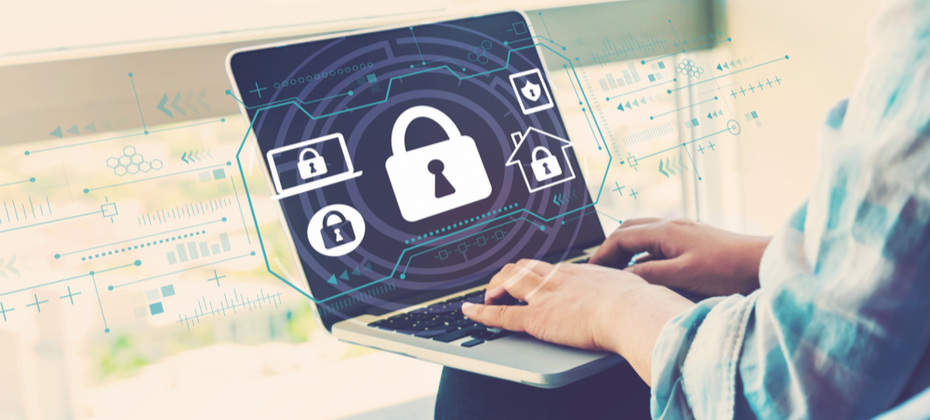NA – North America
News about Experian North America:

If you’re anything like me, you’re likely spending much more time online these days. From online shopping to grocery and food delivery and thumbing through our social media feeds – the COVID-19 pandemic has many of us spending more time in our homes and “plugged in” than ever before. The COVID-19 pandemic has also contributed to an increase in fraud activity. According to the FTC from January to early October 2020, consumers have reported losing a total of more than $156 million to COVID-19-related fraud. At Experian, we are committed to protecting consumer financial health during the pandemic and beyond. Educating consumers about how to protect their personal information online is key to supporting this effort. As we prepare to enter the holiday season in our virtual world and in honor of National Cybersecurity Awareness Month, I’d like to share a few ways you can protect your financial health online: Shop Safely Online As I mentioned, the amount of shopping you do online has likely increased significantly since the start of the COVID-19 pandemic. This is a trend that’s expected to continue. In fact, according to a recent report from Experian, as many as half of consumers globally expect their spending online to increase in the next 12 months. Practicing safe online shopping habits is always important. This is especially true now. While you may not be spending as much time in airports or your local coffee shops, it is a good practice to avoiding using your financial information to make purchases online if you are on a public WiFi network. Without a password protected network, you have a higher risk of fraudsters gaining access to your banking information which could significantly damage your financial health. Using a virtual private network or a VPN can be an added layer of protection when you are entering your financial information online. Using a credit card to make your online purchases is also a useful way to protect yourself against losses tied to fraudulent charges. According to the federal Fair Credit Billing Act if your credit card — the physical card — is stolen and used to make fraudulent purchases, your issuer can hold you responsible for up to $50 in fraudulent charges. However, if you report the card stolen before any fraudulent charges are made, you have no liability. If your card number is stolen but you’re still in possession of the card, you’re not responsible for any fraudulent charges. Avoid Falling for Phishing Emails Phishing is an attempt to obtain sensitive information for criminal and fraudulent purposes through email. Against the backdrop of the pandemic, there have been increased reports of phishing attempts around COVID-19 testing, vaccines, treatments and cures. Keep in mind that generally if something sounds too good to be true, it likely is. To prevent damage to your identity or your financial health avoid opening any suspected phishing emails and never click on included links. While phishing emails are getting more sophisticated, there are a few clues that can help you identify one in your inbox. If you receive a suspicious looking email, look at the sender name or email address. Phishing emails tend to have suspicious email addresses that are often different than the name of the sender (it could be anything from a slight misspelling of the senders name to an email address that is completely different). It’s also common for phishing emails to use urgent language and include unusual attachments or links. While reputable organizations may sometimes ask for personal information over email, pay close attention to the details of the email before sharing any of your information. It may be a better idea to call the requesting organization and find out if there is a more secure way to do whatever it is they may be requesting. Always think twice before clicking any links. When in doubt, type the organization’s name into an internet search and visit the site directly. Protect Your Passwords This is a basic point, but one that is commonly overlooked. Using complex passwords can be your first line of defense against potential cyber threats. I know it can be challenging but avoid using the same password for multiple online accounts. When you’re creating unique passwords, it’s best to include a minimum of eight characters with a variety of letters, numbers and symbols. Keeping track of your passwords for your online bank accounts, email, social media, shopping apps and online medical portals can be a lot to manage. A password manager subscription can be a convenient and secure way to manage your passwords. They are affordable and more secure than writing down all your passwords or using the same password for multiple accounts. Avoid Over Sharing on Social Media Oversharing on social can lead to unwanted implications. For example, fraudsters and criminals can learn a lot about you from the data included in the photos you share online, including where you are and when you are there. Avoid photos of items that can be used to determine more information about you such as your license plate or the front of your home. Keep in mind, that while it may be tempting to share photos of your family vacations on your social networks, this may also tell unwanted visitors that you are not home. Use tools to Combat Fraudsters Checking your credit report regularly can help you stay informed about potentially fraudulent activity. In an effort to encourage consumers to monitor and understand the information in their credit reports, Experian joined forces with the other U.S. credit reporting agencies, to offer free weekly credit reports to all Americans through April 2021 via www.annualcredreport.com. Credit monitoring services can help you spot potential fraud early. Experian offers free and paid services that provide daily credit monitoring alerts for things like new inquiries and accounts opened in your name, changes to your personal information and suspicious activity detected on your Experian credit report. You can find more National Cybersecurity Awareness Month resources to protect yourself online here.

As the nation’s leading Credit Bureau, we have two primary goals. On one hand, we want to provide lenders the data necessary to assess the risk that a loan applicant represents. On the other hand, we want to help consumers build credit and improve access to credit. This bifurcated set of objectives is the inspiration behind our annual State of Credit report. Each year, this report provides a view into how consumers are managing credit, including their debt levels, on-time payments and utilizations rates. Now in its 11th year, our latest report shows promising signs in terms of how consumers are managing their debts against the backdrop of the COVID-19 pandemic. While there is no question the global pandemic has created many financial challenges for consumers, this report shows something I’ve always believed: many American consumers are resilient, they make smart decisions in light of a difficult environment and they adjust their financial habits. Specific evidence for that assertion can be found as we compare 2019, the year prior to the pandemic and 2020, the year marked by the impacts of the pandemic. Year-over-year, consumers lowered their credit card balances, decreased their utilization rates and reduced delinquency rates on the recurring monthly payments they need to make to service their debt. These factors attributed to an average credit score of 688 — a six-point increase from the same period in 2019. You can view additional findings from this year’s report here. The Value Credit Data in America When determining whether to extend an offer of credit to a consumer, lenders can gain excellent insight into a consumer’s risk profile from the information included in a consumer’s credit profile. It details a consumer’s financial track record and delivers a historical view of how a consumer is managing and repaying debt over time. This information helps lenders determine who can fulfill their financial obligations and ensures consumers continue to have access to credit. Recently, there are reports of using alternative means to assess consumer creditworthiness such as cash-flow data. While Experian is a recognized leader and advocate for the use of alternative data, the use of cash flow data alone can be risky. For example, consumer’s savings have also increased since the start of the pandemic. If a consumer is responsibly and regularly investing in some form of savings, this would narrow their cash flow, which may be misleading and constrain financial access. Looking at a consumer’s credit utilization rate, payment histories and credit balances through traditional credit data remains the primary means to effectively assess lending risk for most American consumers. When necessary, layering traditional credit data with alternative credit data can provide lenders with a more detailed view of a borrower’s stability, ability and willingness to repay. For example, innovations like Experian Boost empower consumers to contribute on time payment histories for additional monthly recurring financial obligations, such as their cable, utilities, mobile phone or Netflix service, directly to their Experian credit report. These payment histories can demonstrate to lenders how reliably consumers are servicing these payments. Incorporating this information has been proven to increase the predictiveness of a consumer’s credit reputation and can complement the data derived from their lending history. Of course, not every American consumer is in a position to adjust their financial habits and make the commensurate smart decisions. Some have had the rug pulled out from underneath them. The CARES Act stimulus was effective in increasing the number of consumers who could maintain their financial health, but still some need more help as we embark on the road to economic recovery from the COVID-19 pandemic. At Experian, we feel that educating consumers about the information included in their credit report and ways they can improve their credit histories will be another factor in getting the economy as a whole humming again and helping those most in need. We pride ourselves to be “The Consumers’ Bureau” and, as such, education will continue to be a primary focus for us. In an effort to encourage consumers to regularly monitor and understand the information in their credit reports, Experian joined forces with the other U.S. credit reporting agencies to offer free weekly credit reports to all Americans through April 2021 via www.annualcreditreport.com. Experian also offers consumers free access to their credit report and ongoing credit monitoring at Experian.com. For additional ways to maintain a healthy credit profile, I encourage you to: Join Experian’s #creditchat hosted by @Experian on Twitter with financial experts every Wednesday at 3 p.m. Eastern time. Visit the Ask Experian blog for answers to common questions, advice and education about credit. Add positive telecom and utility payments to your Experian credit report for an opportunity to improve your credit scores by visiting experian.com/boost[1] For additional resources, visit https://www.experian.com/consumereducation or experian.com/coronavirus. [1] Results may vary. See Experian.com for details

There are many responsibilities I carry as CEO of Experian North America. All of them critical in terms of client relationships, product offerings, innovation, culture, our people and our purpose. A part of my work that I'm extremely passionate about is how we make a difference to consumers and their financial health. As leading data and technology company – and the world’s largest credit bureau – we have the opportunity to work with organizations and individuals every day to help them achieve their financial goals. And while that is good for business, it is also good for society and consumers. That is why I am pleased to join the HOPE Global Forum and John Hope Bryant to announce our new partnership. Operation HOPE is a national nonprofit with goals that align with our own at Experian: to uplift disenfranchised youth and adults from poverty to thriving in a credit ecosystem. We are committed to helping vulnerable communities with our data, analytics, products and services and working with Operation HOPE will help us further that mission. One way we have already been doing that is through products like Experian Boost, designed to drive financial inclusion and help people get fair and affordable access to credit. I have seen firsthand how these actions can change people’s lives. Let me tell you about an Experian Boost customer named Lawrence. Last spring, in March of 2019, his credit score was 640. He was already enrolled in our credit monitoring services, but was not proactive in trying to improve his credit score. Then, he tried Experian Boost. He was able to show positive payment history for utilities, cable, and his cell phone bills. Instantly, his score jumped 30 points. Following the advice of our credit education resources, he paid down his credit cards, which propelled his score even higher. He now has a credit score of 770. What does this mean for Lawrence and his family? Previously, they owned one car and paid 18% interest on that loan. Now, the family has two cars, and they pay 5% and 8.2% on two car loans. This represents incredible savings the family can now use for other needs, and increased access to financial services that can help them achieve other goals. This is what we mean when we talk about empowering consumers so they can have financial freedom. For some, this means the ability to purchase a car, have a credit card, own a home, or simply just save money. The financial health journey can start at any time and have a lifetime impact. I am really excited about this partnership. Together we have the potential to make a tangible difference in financial inclusion in the United States, combining Operation HOPE’s education and counseling programs with our credit education knowledge, capability and services like Experian Boost.

At Experian, we are committed to educating consumers about how to manage their credit histories and protect their financial health. At the same time, we know the COVID-19 pandemic has created a difficult economic reality for millions of Americans. In response, many people have questions about how to protect themselves financially, including their credit histories and scores. To address these questions, we partnered with pro football legend and American Ninja Warrior host Akbar Gbajabiamila to educate consumers across the country about steps they can take to protect their financial health and their credit standing. Gbajabiamila, author of “Everyone Can be a Ninja,” is passionate about helping people develop a financial game plan and he understands having a good credit history is a key component of good financial health. These interviews provided a platform for Gbajabiamila to share the four-point financial fitness game plan consumers can use protect and improve their financial health during the pandemic, including: Contacting your lenders as soon as possible if you think you may miss a payment. Many lenders provide emergency support, which can help protect your credit standing. Getting credit for paying cable, satellite, internet, Netflix and utility bills on time with Experian Boost Exploring balance transfer options or other introductory credit offers through Experian Credit Match Checking your credit report regularly. It’s free once a week at AnnualCreditReport.com. Tune in to Gbajabiamila’s interview with NBC Washington and hear his message to consumers in the videos below. For more credit education resources and tools: Join Experian’s #CreditChat hosted by @Experian on Twitter with financial experts every Wednesday at 3 p.m. Eastern time Visit the Ask Experian blog for answers to common questions, advice and education about credit For additional resources visit www.experian.com/coronavirus

In 2013, I came out to my brother. Sitting down at dinner, knowing whole-heartedly that he would fully accept me and nothing with our relationship would change, I was still scared. Each year on October 11, National Coming Out Day, I reflect on that first coming out experience and what I truly feared. Even though I knew I was safe, I also knew that coming out to him was just the start of coming out every single day for the rest of my life. It was the start of facing discrimination and judgment both in day-to-day life and professionally. It wasn’t a decision I made lightly. Coincidently, my brother came out to me at that very same dinner which certainly took some weight and anxiety off my shoulders. We came out to our family, together later that week and we were welcomed with love, acceptance, and support. The unconditional support I received is not normal, but my anxiety around the process was. I am grateful and quite lucky that my initial coming out process to my family was, for lack of a better term, easy. Like many others I don’t experience that same ease everywhere I go. I have been asked to leave restaurants, turned away from stores, spat on multiple times, and even asked to leave mass during service. I am regularly questioned when entering or leaving a women’s public restroom. Michele Bodda, our executive co-sponsor of Experian’s Pride employee resource group, said it perfectly in her message two years ago, “The difficulty some of our LGBT+ colleagues face making daily decisions about where they can be fully present aren’t merely insecurities. They are the realities of being LGBT+.” Let that sink in. Coming out is not a one and done experience, it is something we do over and over throughout our lives. That reality impacts people in different ways, and it’s why acknowledging National Coming Out Day means so much to me - why it means so much to many others. I feel particularly fortunate to work for a company that celebrates and recognizes our uniqueness. I know many people at Experian, like myself, who feel empowered and supported to bring their whole self to work and that reality is assuring, professionally and personally. I have been told I am brave for bringing forth my full authentic self each day. During a time of such global anxiety, uncertainty, and open expressions of intolerance and hatred, being a voice of empowerment, representation, and visibility for folks who do not feel comfortable being out is more important than ever. I’m willing to be a voice so others know they are not alone. Be brave with me. And if you’re not ready, I understand. I’m here for you when you are.

In a world that was already becoming increasingly digital, COVID-19 expedited timelines and turned forecasted projects into immediate needs nearly overnight. I’ve seen this play out in my role at Experian as well as across the financial services industry. Experian was recognized as an innovative company prior to the pandemic and the current environment has only accelerated our ability to innovate. As we surpassed the six month mark adjusting to our new normal, I was invited to join Bloomberg’s Future of Finance: Leveraging Digital Transformation for a Virtual World roundtable discussion with Senior Analyst of Bloomberg Intelligence Julia Chariell and leaders from IBM, Ally Financial, Deutsche Bank and others, to share how we are rising to meet the needs of consumers and lenders during the COVID-19 pandemic. You can find a recap of our conversation here and view the full video discussion here. We know each American is facing unique COVID-19-related circumstances, so there is not a one-size-fits-all solution. This notion has carried us as we are rising to meet the needs of our clients and consumers during the pandemic. We must allow individuals who can still meet their financial obligations to have access to credit and ensure lenders can identify them. Maintaining and improving financial access for these consumers will play an important role in our road to economic recovery. To continue to lend responsibly, the financial services industry must carefully examine all aspects of consumer financial capability in near real-time – consumer control and consumer-permissioned data play a key role in achieving this. By leveraging accurate data, I believe we have a chance to lessen the impact of the current U.S. economic crisis, extend credit responsibly, and support the hardest-hit consumers as we adjust to a new world post COVID-19.

Identity has always been the cornerstone of the advertising ecosystem; the connective tissue that helps brands create a more relevant experience for consumers. For the past 20-plus years, identity has heavily relied on the third-party cookie. But with the third-party cookie set to become obsolete in the next year and a half, and to a lesser, unknown extent, Apple’s pullback on the identifier for advertisers (IDFA), the industry needs to re-evaluate and adapt. Without the third-party cookie, identity is a bit more complicated. Consumers engage brands through hundreds of different devices, apps and channels—and with walled gardens and disparate data sources, it’s tough to connect these digital touchpoints together. Add to that, the hundreds of offline interactions consumers have, and the single-customer view is unattainable; at least without the right data resources and partners. With little concrete direction on how to move forward in the post-cookie world, finding the right identity resolution partner can help you connect digital and offline touchpoints and better understand consumers. Forrester recently released its Now Tech: Identity Resolution, Q3 2020 report, identifying 28 identity resolution providers that can help with identity data management, analysis and measurement. Experian is proud to be included on the list. These identity resolution products serve a number of different use cases and it is important to select a vendor that you can trust while navigating this dynamic market. The new report states “Marketers must proactively calculate how industry changes impact identity resolution and marketing efforts, evaluate current partners’ ability to accommodate changes, and consider alternative providers and approaches.” Finding new ways to approach identity resolution is challenging in such a dynamic industry; the path forward likely isn’t rooted in a single identifier. Experian is committed to helping you resolve consumer identities. Our solutions connect consumers at every touchpoint and execute matching in a privacy-compliant manner. The phase-out of third-party cookies has already changed the advertising industry as we know it. But the deprecation of third-party cookies does not mean then end of people-based advertising; we still need to provide a relevant experience for consumers. The balance between data privacy and security with relevancy is achievable; the right partner can help you get there. Learn more about how Experian can help you resolve customer identities.

In the midst of COVID-19, we’ve seen the digital transformation accelerate at a rapid pace—and it’s likely to continue in the months and years ahead. According to McKinsey & Company’s COVID-19 Consumer Pulse survey, most business types have seen more than 10 percent growth in their online customer base during the pandemic and many consumers plan to continue shopping online when store locations reopen. While the shift to digital began well before COVID-19, what does the sudden spike mean for marketers? In short, it means digital campaigns have become mission critical—and subsequently, data has become more important than ever. People are more than just their interactions with your brand. They consume information and engage other brands from multiple devices and channels, resulting in hundreds of digital touchpoints. You need to use data to connect these touchpoints to better understand your audiences’ needs, inform your messaging, optimize digital campaigns, and most importantly, build and establish a human connection. Businesses have troves and troves of data, but oftentimes struggle to generate insights. You need to find the right partner to help manage the data and unlock its potential. To help, Forrester recently released its Now Tech: Consumer Data Marketing Services, Q3 2020 report that provides an overview of 22 consumer data marketing providers that can help you leverage your first-party data and create a more comprehensive view of customers and prospects—Experian is proud to be included in the list. Finding the right partner is important; you have to remember data is a privilege and you need a partner that can help you provide value to your customers—otherwise, trust can quickly erode. And without trust, data and your marketing campaigns become obsolete. Identify what matters most to you. Do you need to enrich your current database? Build look-a-like audiences? Do you need to connect digital and offline identities? Do you need to activate your data? With a strong foundation in data and identity resolution, Experian is committed to helping you learn more about your customers and help them navigate their unique circumstances. Experian's ConsumerViewSM database includes attributes on more than 300 million consumers and 126 million households, including demographic data, purchasing behavior, and lifestyle information. In addition, our MarketingConnectSM platform eliminates the need for disparate solutions and enables marketers to access and manage offline and online customer identity attributes, such as MAIDs and IPs. Now, more than ever, consumers want to be heard. You need a data-driven strategy to meet that expectation. The right partner can help you expand what you already know about your customers and allow you to communicate with them effectively and address their most pressing needs. Learn more about how Experian can help you maximize the potential of your data.

In May 2020, Experian launched Sure Profile and became the first company with an offering to fight synthetic identity fraud that’s integrated into the credit profile with market-leading assurance. In fact, we are so confident in our solution that we’ll share in loan losses on assured profiles if we get it wrong, a first for the industry. Recently, International Data Corporation (IDC) highlighted Sure Profile in the report, IDC, Synthetic Identity Fraud Update: Effects of COVID-19 and a Potential Cure from Experian (doc #US46690220, July 2020) stating “IDC Financial Insights believes that Experian's Sure Profile has the potential to have market disrupting effects in the battle against SIF (synthetic identity fraud).” According to McKinsey, synthetic identity fraud is the fastest growing financial crime in the United States, accounting for 10% to 15% of lender losses each year. Synthetic identity fraud occurs when fraudsters combine real and fake information to create “Frankenstein IDs” which are then used to obtain credit or to add these identities as authorized users to existing credit accounts. Then, financial institutions report the identities to credit reporting agencies. A new record with the false information is created and subsequently, the synthetic identity can be used to generate other fake accounts. It is a significant problem that Juniper Research expects will lead to $48 billion in annual online payment fraud losses by 2023. IDC recommends that financial institutions consider Sure Profile when researching how to fight synthetic identity fraud. For institutions that use an analytical platform to detect synthetic identities, IDC suggests examining Sure Profile to see how it can supplement their models, or even replace them. "Synthetic identity fraud is a massive problem for banks, and I believe that the effects of COVID-19 will exacerbate the problem. However, at the same time, Experian launched a new offering that I believe will be a game changer for how banks attack the synthetic identity problem." — Steven D'Alfonso, research director, IDC Financial Insights Sure Profile validates identities, detects profiles that have an increased risk for synthetic identity fraud and helps cover resulting losses for assured profiles. Leveraging the capabilities of the Experian Ascend Identity Platform™, it uses data to drive advanced analytics, including newly developed machine learning models that predict the likelihood of synthetic identity behavior. Sure Profile provides lenders a simple approach to define and detect synthetic identities early in the originations process. To learn more, check out Experian's Sure Profile.